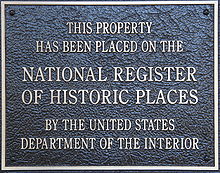
Back السجل الوطني للأماكن التاريخية Arabic Rexistru Nacional de Llugares Históricos AST Tarixi Yerlərin Milli Reyestri (ABŞ) AZ National Register of Historic Places BAR National Register of Historic Places BCL Нацыянальны рэестр гістарычных месцаў ЗША BE Registre Nacional de Llocs Històrics Catalan US National Register of Historic Places CEB National Register of Historic Places Czech National Register of Historic Places Danish
 An NRHP plaque | |
| Agency overview | |
|---|---|
| Formed | 1966 |
| Jurisdiction | United States |
| Headquarters | Main Interior Building, Washington, D.C., U.S. |
| Agency executive |
|
| Parent department | National Park Service |
| Website | nps.gov/nationalregister |
The National Register of Historic Places (NRHP) is the United States federal government's official list of sites, buildings, structures, districts, and objects deemed worthy of preservation for their historical significance or "great artistic value".
The enactment of the National Historic Preservation Act (NHPA) in 1966 established the National Register and the process for adding properties to it. Of the more than one and a half million properties on the National Register, 95,000 are listed individually. The remainder are contributing resources within historic districts.
For most of its history, the National Register has been administered by the National Park Service (NPS), an agency within the United States Department of the Interior. Its goals are to help property owners and interest groups, such as the National Trust for Historic Preservation, and coordinate, identify and protect historic sites in the United States. While National Register listings are mostly symbolic, their recognition of significance provides some financial incentive to owners of listed properties. Protection of the property is not guaranteed. During the nomination process, the property is evaluated in terms of the four criteria for inclusion on the National Register of Historic Places. The application of those criteria has been the subject of criticism by academics of history and preservation, as well as the public and politicians. A property listed in the National Register, or located within a National Register Historic District, may qualify for tax incentives derived from the total value of expenses incurred in preserving the property.
Properties can be nominated in a variety of forms, including individual properties, historic districts and multiple property submissions (MPS). The Register categorizes general listings into one of five types of properties: district, site, structure, building or object.
National Register Historic Districts are defined geographical areas consisting of contributing and non-contributing properties. Some properties are added automatically to the National Register when they become administered by the National Park Service. These include National Historic Landmarks (NHL), National Historic Landmark Districts (NHLD), National Historic Sites (NHS), National Historical Parks, National Military Parks, National Memorials, and some National Monuments.